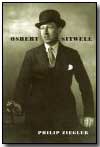Prose & Poetry - Sir Osbert Sitwell
 Sir Osbert Sitwell (1892-1969) was born in London
on 6 December 1892, the son of Sir George Sitwell. He was raised in
Derbyshire and educated at Eton.
Sir Osbert Sitwell (1892-1969) was born in London
on 6 December 1892, the son of Sir George Sitwell. He was raised in
Derbyshire and educated at Eton.
During the First World War Sitwell reluctantly served as an officer in the Grenadier Guards, with whom he served in France for various periods from 1914 to 1917. He had earlier twice failed the examination for entry to the military academy at Sandhurst. His experiences left him with hatred with war. The Winstonburg Line (1919), an early poem, was markedly pacifist in tone and was part-intended as a satire of Winston Churchill..
Along with sister Edith and brother Sacheverell, Osbert Sitwell was a patron and pioneer of style, remembered chiefly for his five-volume autobiography, Left Hand, Right Hand! (1945-50, comprising Left Hand, Right Hand!; The Scarlet Tree; Great Morning; Laughter in the Next Room and Noble Essences). A late addition to his autobiography, Tales my Father Taught Me, followed in 1962.
In his autobiography he painted a marvellously evocative picture of an age and a culture that now seem almost entirely vanished, and are remarkable for the portrait of the eccentric, exasperating figure of his father, Sir George. His memoirs achieved tremendous success in both Britain and the US, the latter of which he and sister Edith triumphantly toured in 1948.
Sitwell was the author of poems, short stories, novels and memoirs. The majority of his poetry is light and satiric. His short stories include Triple Fugue (1924); the novel Before the Bombardment (1926), a novel describing the shelling of Scarborough in 1914 and its effect on the lonely, genteel female society of the town; Collected Poems and Satires (1931) and Selected Poems (1943).
Upon his father's death in 1943, Sitwell became 5th baronet. A highly combative figure in the British literary scene, he argued with virtually everyone and was a noted class snob, loathing the middle classes. He took much delight in being admired by the Royal Family.
"Hun" was a slang term used by the allies, to describe the Germans. "Boche" was another.
- Did you know?
